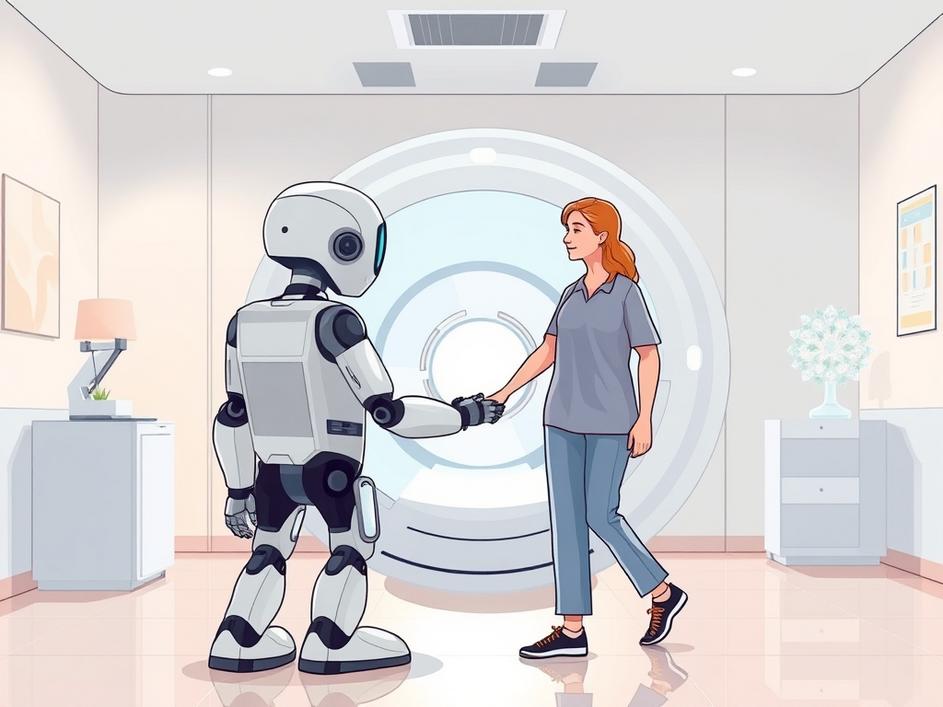


We are a digital agency helping businesses develop immersive, engaging, and user-focused web, app, and software solutions.
2310 Mira Vista Ave
Montrose, CA 91020
2500+ reviews based on client feedback

What's Included?
ToggleNobody looks forward to a medical test, especially when it’s a big one. You know the kind – those extensive scans doctors order to peek inside your body and figure out what’s going on. We often hear about how amazing these technologies are for spotting serious health issues like cancer early, and they truly are life-saving. But for the person actually getting the scan, it’s rarely a simple in-and-out visit. There’s often a whole load of worry that comes with it, not just about the results, but about the process itself. Think about a PET scan, for instance. It’s a powerhouse for detecting and tracking cancer, but the experience can be quite the ordeal. Patients often face a laundry list of instructions, strict fasting rules, and a long wait, adding a significant layer of stress to an already anxious time. It’s a reminder that even the most advanced medical tools can still feel very human in their impact on our daily lives.
The current reality of getting a PET scan is often a logistical challenge, both for patients and the healthcare system. Imagine you’re told you need one. First, there’s the initial shock and concern about your health. Then, you’re hit with the prep: no food for many hours, sometimes specific diets days before, and a need to stay calm and still during the scan itself. The procedure involves a special tracer substance and requires you to lie still for a long time inside a large machine. These scans are also expensive, and the specialized equipment and staff needed mean they aren’t available everywhere. People often have to travel significant distances, sometimes across states, to reach a facility that offers them. This creates massive bottlenecks, leading to long waiting lists and a lot of emotional and physical strain. For many, especially those in rural areas or with limited means, simply getting access to this vital diagnostic tool becomes a huge, almost insurmountable, hurdle. It’s a situation where the cure feels almost as taxing as the illness.
So, what if we could make this whole process much easier, more comfortable, and wider reaching? That’s exactly the kind of big question a team from Oxford, called RADiCAIT, is tackling head-on. They’re using the power of artificial intelligence to rethink how PET scans work. Imagine an AI system that can take less information – maybe from a shorter scan time or using less of that special tracer substance – and still create clear, detailed images that doctors need. This isn’t about cutting corners; it’s about making things smarter and more efficient. By doing so, they aim to reduce the time a patient spends in the scanner, potentially ease some of those tough preparation rules, and even lower the overall cost of the procedure. It’s like having a super-smart assistant that can piece together a complete picture from fewer puzzle pieces, making the whole process less demanding for everyone involved. They’re even gearing up to showcase this innovative work, which tells us they’re confident in its potential.
If RADiCAIT’s approach takes hold, the benefits could spread far and wide. For patients, it means a significant reduction in the anxiety and physical discomfort associated with getting a PET scan. Less fasting, shorter scan times, and potentially quicker appointments translate to a much less stressful experience during an already trying time. This could also mean earlier detection of diseases, as more people might be able to access these scans without the previous barriers. For healthcare systems, the implications are huge. Making scans faster and potentially more affordable could free up valuable machine time, allowing more patients to be seen each day. It could also reduce the need for such high doses of expensive tracers, leading to significant cost savings. This efficiency could help hospitals manage their budgets better and extend critical diagnostic services to underserved communities, truly democratizing access to life-saving technology. It’s about making healthcare work better, for more people, more effectively.
What RADiCAIT is doing isn’t just a win for PET scans; it signals a much bigger shift in how we approach medical imaging overall. This kind of AI-driven innovation sets a precedent for other diagnostic tools. Imagine if MRI or CT scans could also be made faster, more comfortable, or more widely available thanks to similar AI advancements. It points to a future where highly specialized and often intimidating medical tests become just another, more manageable part of a routine check-up or diagnostic journey. This kind of progress doesn’t just improve individual tests; it reshapes the entire diagnostic landscape, making healthcare more proactive, accessible, and patient-friendly. We’re moving towards a system where technology isn’t just about finding problems, but about solving the problems that arise from the diagnostic process itself. It’s exciting to think about how this intelligent application of technology could simplify so many complex aspects of modern medicine.
In a world where medical advancements often feel complex and out of reach, it’s truly inspiring to see companies like RADiCAIT focusing on making critical diagnostics more human-centered. They’re taking something that is currently a major stressor for patients and a bottleneck for healthcare providers, and applying smart technology to chip away at those challenges. By making PET scans less demanding, more affordable, and more widely available, they’re not just improving a medical procedure; they’re improving the quality of life for countless individuals facing serious health concerns. This isn’t some distant science fiction; it’s happening now, promising a future where cutting-edge care is more easily accessed by everyone who needs it. It’s a powerful reminder that innovation, when focused on real human needs, can bring profound and positive change.



Comments are closed